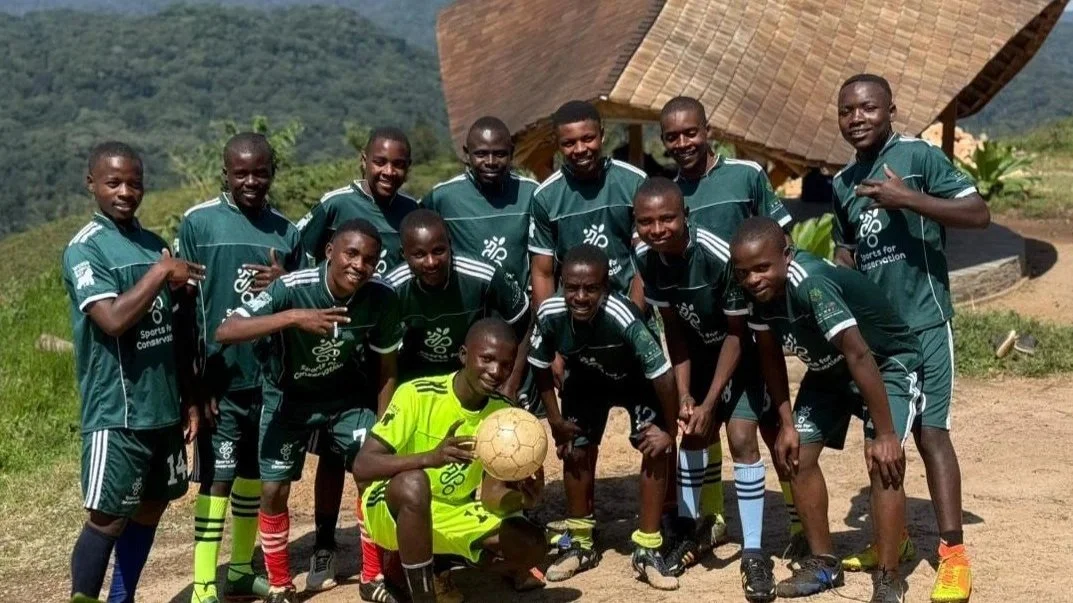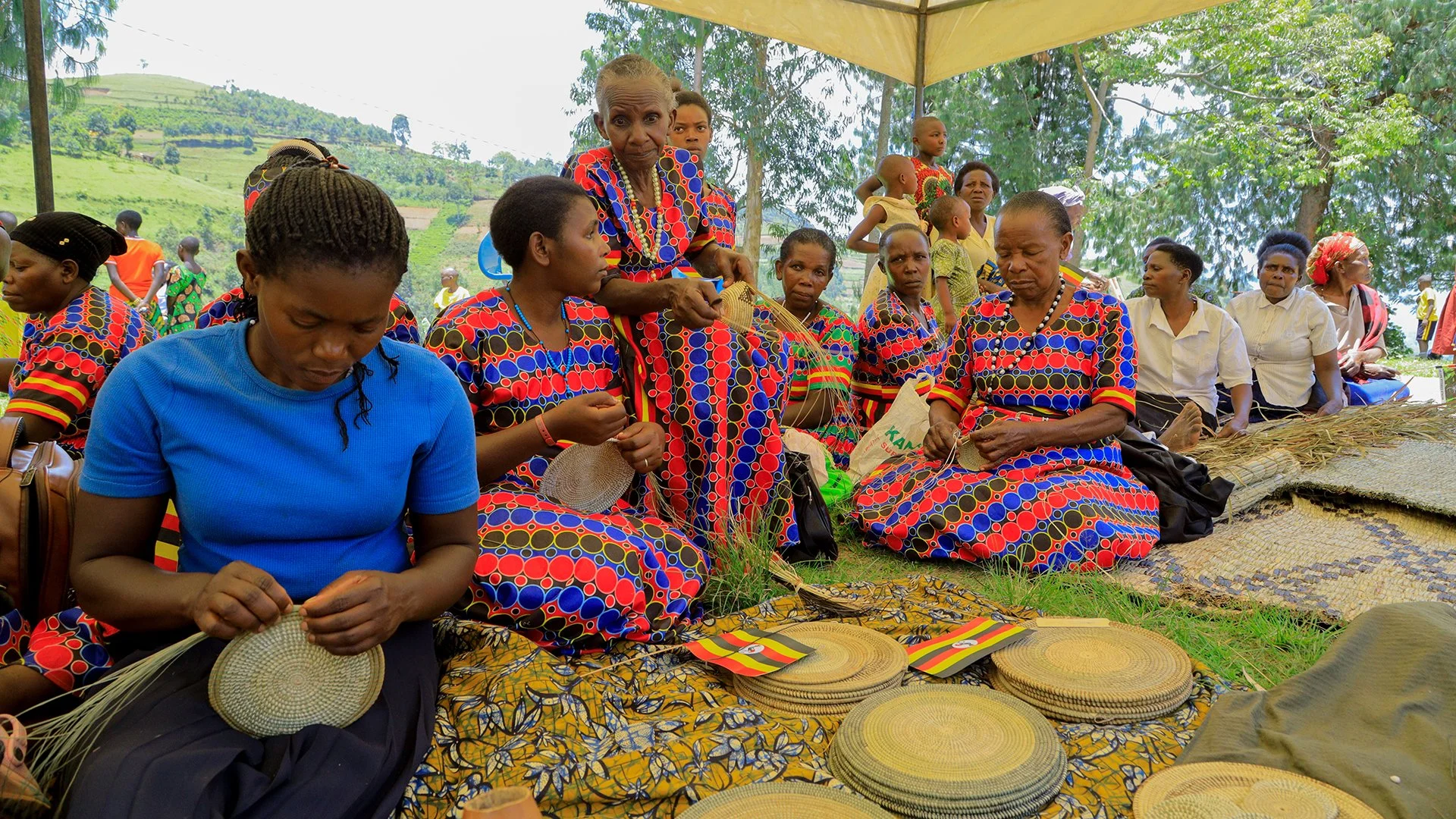Celebrating World Gorilla Day in Bwindi
At the edge of Bwindi Impenetrable National Park, this weekend the hills of Erebero carried the sound of drums and voices as people from surrounding communities gathered to mark World Gorilla Day, a date set aside each year to recognise the importance of protecting the mountain gorilla.
World Gorilla Day, held on the 24 September each year, was created in 2017 celebrating the anniversary of when Dian Fossey’s Karisoke Research Center was founded. The day is used to spread awareness around the pressures facing the world's remaining mountain gorillas. For Bwindi, where just over 450 gorillas remain, the day also offers a chance to link the future of the forest with the lives of those living around it.
This year, Change a Life Bwindi, our impact partner in Uganda, hosted a two-day programme around Erebero Hills, the location of our new Asilia lodge opening next year. Change a Life Bwindi, founded by Tina Katushabe, works with Batwa and Bakiga communities to create sustainable livelihoods connected to conservation
A Dialogue on Plastic and Conservation
The event began with a community dialogue. Leaders, elders, students and researchers gathered in the shade to talk about conservation, the work being done, and what is important to them in order to get involved.
A keynote was delivered by a warden from the Ministry of Tourism and Wildlife, followed by panel contributions from NEMA, Kabale University, and the Max Planck Institute for Evolutionary Anthropology, offering a chance for the gathered crowd to learn more about mountain gorillas.
A key conversation centred on plastic pollution, with a group clean-up planned as part of the event which coincided with World Clean Up Day on 20 September. Everyone got involved with groups of men, women and children spreading out across the nine community centres, collecting litter, in far more quantities than expected.
Tina explained "We prepared to gather plastic by supplying 500 waste bags, but that proved not to be enough. It really demonstrated the problem as they were filled almost immediately. Regardless, we kept collecting and gathering plastic, but we haven’t started to bag the excess up yet. Locally there is an issue with disposing of it as there is no recycling facility, so we are currently looking at ways to have the plastic they gathered collected, and then transported away for proper recycling."
The sight of whole families cleaning the land gave weight to the day. Tina reflected, “Keeping plastic out of Bwindi is so important for the ecosystem. If we want to be forest friendly we need to learn to live without it. This event really helps raise that awareness and allows people to see what a big issue plastic is locally.”
Planting the Slopes of Erebero
Tree planting formed the second strand of the conservation work. Participants learnt how science and indigenous knowledge can be combined in restoration. "This added an extra lesson," Tina added, "Indigenous knowledge is so important when it comes to Bwindi, so we encourage people to keep records to this information isn't lost. We encourage the elders to share stories about the species once common on the hillsides while students recorded notes, and also learnt how to map plantings and keep track of survival rates."
Participants had the opportunity to learn how to make sapling bags from banana fibres. These small woven bio-degradable pots protect the roots of seedlings and are planted into the soil along with the tree. “They add fertiliser to the soil and are forest friendly,” Tina said. “They can make these within the community, we currently buy them from local banana farms for the nursery that supplies the reforestation efforts. It provides an income opportunity.”
On the slopes of Erebero, over 100 trees were planted by the Sports for Conservation team before a match was played. These hills are at the centre of a larger reforestation project supported by NawiriGroup, turning depleted tea plantations back to forest. For the Batwa and Bakiga the emerging forest offers an opportunity to rebuild cultural ties to the forest, reclaiming knowledge once held by elders, and passing on a lost. The project also offers the opportunity to explore new livelihoods linked to the health of the ecosystem.
Celebration
On the 21 September, the focus turned to celebration. From Erebero Hill, a procession wound its way to the village playground, led by a band. The journey was one of song, with people drumming and clapping as they walked.
At the playing field, a group of primary school children presented a music drama they had rehearsed about conservation their voices carrying over the hills as they sang. Certificates were awarded to those who had taken part in the tree planting.
A large exhibition of handmade crafts gave a glimpse of how enterprising villagers are linking income sources to the forest ecosystem. Beekeepers showed their hives and sold honey. Candle makers offered clean-burning products scented with forest botanicals. Basket weavers offered demonstrations and displayed their work. Each stall was both a showcase of skill and a statement that conservation can bring economic value, with many finding markets for their products via the tourism industry.
As the band played its closing notes and the last of the trees were planted, the purpose of the event was clear. Conservation is not a distant idea discussed by outsiders but a shared responsibility, rooted in the soil of Bwindi, carried forward by those who live at its edge.
Tina reflected “We celebrated World Gorilla Day for the community members. It is a coming together to appreciate the organisations that protect the gorillas, is a celebration of ourselves and how our communities can work together, and it raises awareness for those not involved who can see that they can earn and benefit from having the gorillas close by. Over 1,000 joined the celebration and while Bwindi’s gorillas are a global story, this weekend celebration was for the people who live closest to them, their futures linked.






